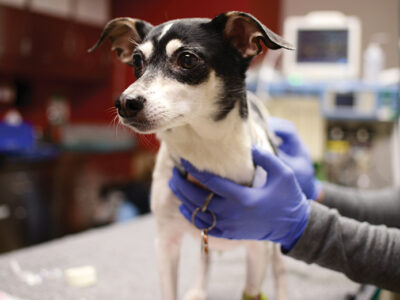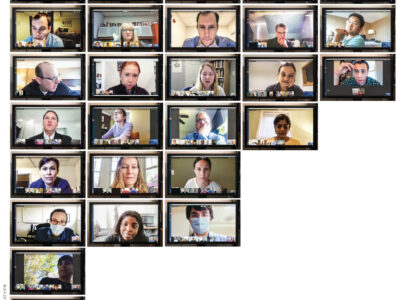Researchers Seek Answers After Gene-Therapy Patient Dies

On September 17, four days after being injected with corrective genetic material, an 18-year-old participant in an experimental gene-therapy trial at Penn’s Medical Center died.
Jesse Gelsinger, of Tucson, Ariz., was the 18th patient to take part in this Phase-I clinical trial, which began in April 1997 as a means to develop an effective treatment for ornithine transcarbamylase (OTC) deficiency. OTC is an inherited disorder that, in its most common form, causes death in affected newborn males because of the inability of their livers to properly process nitrogen in food proteins.
Like the other trial participants, Gelsinger received an injection of genetically altered viruses into his liver. Viruses are sometimes used in gene-therapy studies to transport therapeutic genes into the body, and in the OTC trial, a modified form of the common-cold virus was used to carry corrective genes into the liver cells to help those cells manufacture the needed chemical.
Over the four-day period that followed his treatment, Gelsinger’s condition deteriorated until he experienced multiple-organ failure and his brain stopped functioning. At that point, University officials confirmed, his family decided to withdraw life support.
None of the 17 other participants who preceded Gelsinger in the OTC trial developed any serious side effects. The clinical trial, conducted by researchers at the University’s Institute for Human Gene Therapy, has been voluntarily halted until the cause or causes of Gelsinger’s death can be determined. In addition, appropriate regulatory agencies, including the FDA, have been notified.
“We are deeply saddened and surprised by the death of Jesse Gelsinger, an energetic and bright young man who unselfishly participated in this important study so that, in the long-term, an effective therapy might be developed to prevent or treat OTC deficiency,” said Dr. James M. Wilson, the John Herr Musser Professor and Chair of Molecular and Cellular Engineering who serves as director of the Institute for Human Gene Therapy. “We offer our heartfelt condolences and sympathy to Jesse’s family and friends; and we join with them in recognizing and honoring the bravery and altruism of this young man in choosing to help advance our knowledge of genetic diseases by participating in this trial.”
The patient’s father, Paul Gelsinger, told The Washington Post after his son’s death that he was not angry with the researchers. “They’re as hurt as I am. They’ve promised full dislosure.” But, he added, “I’ve got a ton of questions for them.”
More than 130 patients have participated in gene-therapy clinical trials at the Institute for Human Gene Therapy during the past few years, according to Rebecca Harmon, a spokes-person for Penn’s Health System. “Jesse’s unfortunate death has been our only adverse outcome,” she said. “Right now, physician-scientists from all parts of the Medical Center community have come together to help us review and analyze every aspect of the research protocol so that a determination may be made as to the cause of Jesse’s death.”
While it remained unclear what long-term impact Gelsinger’s death would have on the burgeoning field of gene therapy, the incident did prompt the Food and Drug Administration to order a temporary halt of two similar gene-therapy studies by the Schering-Plough Corporation.
Dr. Savio Woo, president of the American Society of Human Gene Therapy, was quoted in USA Today as saying that the clinical trial was “well designed and properly reviewed” by all of the regulatory agencies. “There was nothing wrong with it,” he added, “but it reflects the fact that, indeed, gene therapy is an experimental therapy.”
“Gene therapy is a more difficult and problematic strategy than people realized at the beginning,” pointed out Dr. Paul Root Wolpe, adjunct assistant professor of sociology and a faculty associate with the Center for Bioethics. It is, he explained, “really experimental in the way that most drugs aren’t, in the sense that not only is the effect of this substance on the body under review, but so is the mode of delivery”—using altered viruses.
“It’s going to take a lot more research and a lot more people are going to be harmed,” he added, “but that is how we advance science. We make sacrifices in order to advance the general good. The ethical protection comes by making sure that subjects understand they’re making a potential sacrifice, and are not misled about the nature of the sacrifice.”
Subjects should participate in research in order to benefit society at large and not with the expectation of being healed, he explained. “Unfortunately, though, that’s how a lot of research is cast today–not only to the subjects but really in the minds of the researchers. Unless they can imply the possibility of direct benefit to the subject, an enormous amount of research we do could not be done.”
Wolpe, who said that his knowledge of the gene-therapy trial was based on newspaper accounts, made it clear that he was not criticizing Penn’s researchers in particular but rather the climate in which such experiments are carried out.
Studies of informed-consent sessions, he pointed out, have shown that researchers often contradict the dispassionate written disclaimers with their spoken words, “implying more than a trivial chance of benefit.” And the fault does not always lie just with the researcher: “Anybody who has done work on informed consent has seen situations where the doctor has gone ‘A, A, A, A,’ and the doctor walks out, and the patient says ‘B.’”
Some ethicists have suggested that neutral third-parties should conduct the sessions to prevent conflicts of interest and insure that patients are fully informed, Wolpe said. “But that adds another layer of cost and complexity, and it has been resisted.”




